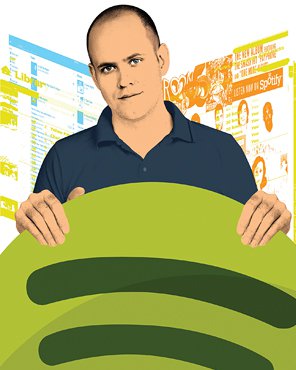In 1999 Daniel Ek was a 16-year-old Swedish programmer, getting rich building websites, when he started asking what he himself now says was a dumb question: How do you get people to pay for music that can, if illegally, be downloaded free—and without charging them for each song, the way Apple’s iTunes service does now?
Ek’s eventual solution: Spotify, a jukebox in the cloud that provides legal, on-demand access to millions of songs. Supported by paying subscribers, as well as by radio-style ads played only to nonsubscribers, the service debuted in the United States last year after operating for three years in Europe; it now has more than 15 million users, four million of whom pay. With an estimated value of $4 billion, Spotify is one of the hottest Internet companies in the world.
Spotify isn’t the only service to let listeners stream music on demand. But it distinguishes itself from Internet radio services like Pandora and Slacker through the vastness of its music libraries and its deep integration into social media. Spotify lets users seamlessly share playlists and swap music on social networks like Facebook and Twitter. And Spotify makes it easy for others to build apps that work with its platform in order to give users yet more ways to discover and share music. “The trick was to think through the social aspect of the service from the very beginning,” says Ek. “We didn’t want it to be an afterthought.”
Spotify’s users can access some 16 million songs—about 15 times more than Pandora makes available. The service offers all those terabytes of music without revealing any of the licensing complexities involved in the process. Ironing out the needed deals with record companies while refining the service ate up two years of Ek’s time before he launched in Europe in 2008. And it took a team of software engineers—the company now has 250 of them—to make the service easy to use in spite of all the programming code that works in the background to prevent music from being illegally copied and distributed. “The best thing about Spotify is that it works at all,” says Ek. “If you’re in Spain and you want to share your music with someone in the U.K., you don’t want to see how we take care of paying licensing fees in both places.”
Now Ek is trying to find ways to make it as easy to find and play music as it is to find and play videos on YouTube. This year the company introduced a radio service for computers and mobile devices, launched its first iPad app, and made it possible to embed a Spotify play button into any website. The Huffington Post, the blogging site Tumblr, and Rolling Stone’s website are among the many that now offer music that way.
For a man capable of turning his teenage vision into a mushrooming empire, Ek claims a surprisingly simple strategy for continued growth. “I just keeping asking dumb questions,” he says.
—Nicole Dyer




